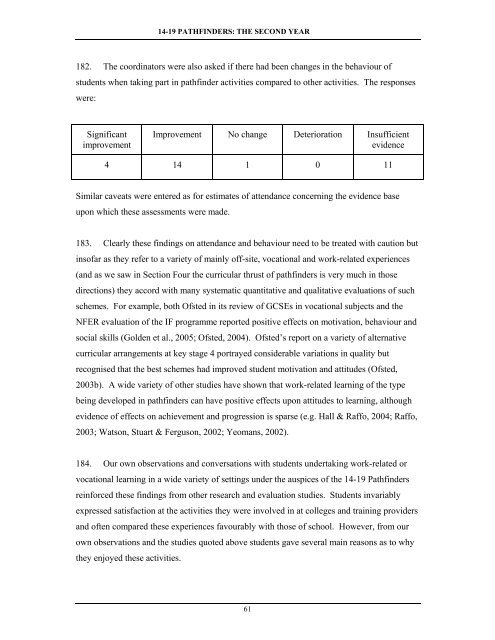Collaborative Approaches to 14-19 Provision - Communities and ...
Collaborative Approaches to 14-19 Provision - Communities and ...
Collaborative Approaches to 14-19 Provision - Communities and ...
- No tags were found...
You also want an ePaper? Increase the reach of your titles
YUMPU automatically turns print PDFs into web optimized ePapers that Google loves.
<strong>14</strong>-<strong>19</strong> PATHFINDERS: THE SECOND YEAR182. The coordina<strong>to</strong>rs were also asked if there had been changes in the behaviour ofstudents when taking part in pathfinder activities compared <strong>to</strong> other activities. The responseswere:SignificantimprovementImprovement No change Deterioration Insufficientevidence4 <strong>14</strong> 1 0 11Similar caveats were entered as for estimates of attendance concerning the evidence baseupon which these assessments were made.183. Clearly these findings on attendance <strong>and</strong> behaviour need <strong>to</strong> be treated with caution butinsofar as they refer <strong>to</strong> a variety of mainly off-site, vocational <strong>and</strong> work-related experiences(<strong>and</strong> as we saw in Section Four the curricular thrust of pathfinders is very much in thosedirections) they accord with many systematic quantitative <strong>and</strong> qualitative evaluations of suchschemes. For example, both Ofsted in its review of GCSEs in vocational subjects <strong>and</strong> theNFER evaluation of the IF programme reported positive effects on motivation, behaviour <strong>and</strong>social skills (Golden et al., 2005; Ofsted, 2004). Ofsted’s report on a variety of alternativecurricular arrangements at key stage 4 portrayed considerable variations in quality butrecognised that the best schemes had improved student motivation <strong>and</strong> attitudes (Ofsted,2003b). A wide variety of other studies have shown that work-related learning of the typebeing developed in pathfinders can have positive effects upon attitudes <strong>to</strong> learning, althoughevidence of effects on achievement <strong>and</strong> progression is sparse (e.g. Hall & Raffo, 2004; Raffo,2003; Watson, Stuart & Ferguson, 2002; Yeomans, 2002).184. Our own observations <strong>and</strong> conversations with students undertaking work-related orvocational learning in a wide variety of settings under the auspices of the <strong>14</strong>-<strong>19</strong> Pathfindersreinforced these findings from other research <strong>and</strong> evaluation studies. Students invariablyexpressed satisfaction at the activities they were involved in at colleges <strong>and</strong> training providers<strong>and</strong> often compared these experiences favourably with those of school. However, from ourown observations <strong>and</strong> the studies quoted above students gave several main reasons as <strong>to</strong> whythey enjoyed these activities.61
















